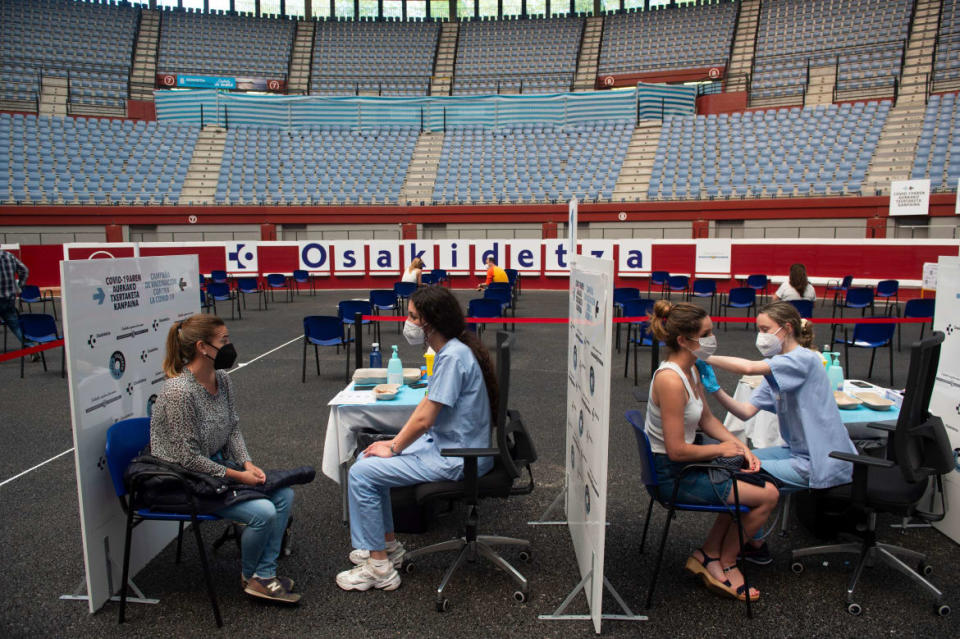The Far-Righters and Foreign Operatives Running the Hispanic World Into COVID Hell

This story was produced in partnership with Coda Story.
BARCELONA—On November 7, 2020, around a thousand people gathered in Madrid to protest against the Spanish government’s COVID-19 restrictions. The demonstration was staged by the activist group Police for Freedom. Alongside far-right elements stood natural health advocates, conspiracy theorists, UFO enthusiasts and members of the dissident Chinese religious sect Falun Gong. Also present was the YouTuber and serving national police officer Jandro Lión, an activist with the Spanish far-right party Vox. Aside from him, the media reported, only a handful of actual police officers took part.
“We give all groups a voice," Police For Freedom spokesperson Sonia Vescovacci told me recently. Vescovacci, a 42-year-old national police officer currently on leave, first got involved with Police for Freedom after creating a YouTube channel focused on the government’s use of law enforcement to manage the country’s coronavirus response. She says that she does not trust politicians and, when asked about her ties to Lión, stated that he is not part of Police for Freedom and attended the protest at her request, in order to film it.
Top Anti-Vaxxer’s Unhinged Quest for Unvaccinated Blood Leads Him to Mexico
Newspaper and television reports have characterized protesters like Vescovacci as “negacionista” (denialists), but she insists that she “denies nothing”. Instead, she says, the idea behind Police for Freedom is to hold to account a government that is “leading the country to ruin.”
“A lot of people are suffering, and they are using the police precisely to that end. We do not agree with this,” she said.
New research shows that COVID-19 skepticism in Spain has been fueled by misleading and false stories, spread online by an eclectic mix of rightwing sympathizers, anti-establishment activists and conspiracy theorists. It can also be traced back to a complex web of sources, spanning Latin American media outlets, Russian disinformation networks and Chinese dissidents.
Throughout the coronavirus crisis, Europe has become a key battleground for such actors. Faced with a torrent of fake news and misleading information, major social media platforms—including Facebook, Instagram, Twitter and YouTube—have attempted to shut down COVID-19-denialist content and accounts. But as in Germany, which has seen the world’s largest anti-lockdown protests, and other countries, these efforts have driven Spanish coronavirus skeptics to the less easily tracked and moderated environment of Telegram.
The messaging app and social network, which boasts half a billion users worldwide, was already relatively popular in Spain. During the pandemic, it has become a haven for coronavirus denialism. Over the past six months, myself and Laura Aragó from the Spanish newspaper La Vanguardia analyzed 60 channels and groups on Spanish Telegram, all of which have grown rapidly over the past year—some reaching hundreds of thousands of followers.
The Madrid demonstration was one of several that followed the Spanish government’s announcement of a strict curfew at the end of October, part of the nation’s measures to control the spread of the coronavirus. Some turned violent, with police pointing to infiltration by extreme-right groups. In the aftermath of an October 2020 protest-turned-riot in central Barcelona, Mayor Ada Colau condemned graffiti including the words “Fuck Jewish” and “Stop Plandemia,” alongside a crossed-out Star of David.

The surge of demonstrations coincided with plummeting public confidence in official pandemic narratives. According to a poll by Ipsos, Spain’s declining willingness to vaccinate—down from 72 percent in August 2020 to 64 percent in October—corresponds with a similar trend observed in the world’s main democracies. Another survey commissioned by Spanish newspaper El Pais in November found that nearly 65 percent of respondents believed that COVID-19 was created in a laboratory, while more than 40 percent believed that there is a conspiracy behind the vaccines. One in five said they would get vaccinated only if strictly necessary, while 13 percent said they would never do so.
Disinfo Superspreaders
So, who is behind the misinformation fueling this widespread rejection of accepted science? One of Spain’s most popular COVID-skeptic Telegram channels is Noticias Rafapal, run by Rafael Palacios. “Telegram has been the salvation of free people,” he told us via email, adding that other platforms have “prohibited debate” on the pandemic.
Palacios, a middle-aged man with a background in media and communications, said that his previous work experience has taught him that mainstream news outlets are all beholden to the “economic powers that govern Planet Earth.”
With 126,000 subscribers, Noticias Rafapal has been one of the biggest spreaders of Russia-linked coronavirus misinformation on Spanish Telegram. But it is not alone. Many channels have shared content from Russian-backed Spanish-language media, including RT en Espanol, Sputnik Mundo, and other Spanish-language editions of outlets that the U.S. State Department has identified as Russian proxies, including Global Research, South Front and News Front.
The volume of Spanish-language content produced by Russia-linked media is massive. The Spanish social media accounts of RT and Sputnik have a combined following of more than 26 million—substantially more than their English-language counterparts, at around 19 million—and even their Russian ones. EUvsDisinfo, a European Union project tracking disinformation, also found that Spanish content attracted more interactions and engagement than that in other languages, especially if it was related to Russia’s Sputnik V vaccine.
Near the start of the pandemic, Russia-linked outlets were involved in suspicious activity on Facebook. In April 2020, Facebook took down pages and accounts affiliated to News Front. Analyzing the pages and accounts that were removed, the Atlantic Council’s Digital Forensics Research Lab found that News Front’s Spanish-language pages heavily amplified content from RT, Sputnik and state-controlled outlets such as TASS and RIA Novosti.
GOP’s Response to Russian COVID Disinfo Shows We’re Screwed
According to both the State Department and EUvsDisinfo, Latin American audiences form the main target of Russian-linked Spanish-language disinformation. In the spring of 2020, Spanish editions of Russia-linked media spread conspiracy theories that NATO was using the coronavirus as part of a new anti-China strategy and pushed the idea that U.S. labs were behind the COVID-19 outbreak.
By the tail end of 2020, those outlets were focusing on the promotion of Sputnik V. With content explicitly trained on Latin American audiences, they continually trumpeted the success of the Russian vaccine and undermined those developed elsewhere at a time when countries in the region were procuring shipments. Questions about Sputnik V’s efficacy were also rubbished. Since then, a number of Latin American countries have asked for the Russian vaccine, including Argentina, Mexico and Venezuela, even though the majority of Russians remain reluctant to take it.
One—possibly unplanned—consequence of the blizzard of disinformation targeting Latin America is its potentially deadly leakage to Spain itself. Our research did not reveal how much content intended for Latin America reaches Spain, but since January, vaccinations have been by far the most popular topic on Spanish Telegram’s COVID-19-skeptic channels and groups, perfectly coinciding with the shift in focus of Russian media outlets.
One RT en Espanol article posted on Noticias Rafapal in March stated that AstraZeneca might have used outdated data for its vaccine studies. The piece attracted nearly 93,000 views on the channel alone. Another RT story, quoting a former World Bank employee and linking vaccination drives to a shadowy plan for population control, racked up more than 100,000 views.

Countless similar stories from Russian media have been shared within Spain’s COVID-skeptic Telegram channels and groups, not to mention on other social media platforms. But, while content from state actors like Russia plays a significant role in Spain, it is just part of a much broader disinformation ecosystem.
The Watchman
Marcelino Madrigal has closely tracked disinformation related to the pandemic. For many years, he worked for a Spanish IT and defense systems company. Colleagues nicknamed him “The Guru,” owing to his formidable analytical skills. After he was laid off, shortly before the coronavirus began to wreak havoc on the world, he began to monitor the spread of false information about the disease on social media.
Speaking via video call while chain-smoking at his desk, 56-year-old Madrigal described the three main types of homegrown disinformation actors operating in Spain. First comes the alternative medicine lobby, pushing unproven natural remedies for the virus. Close behind it are personalized Telegram channels like that of Rafael Palacios. “And last but not least, we have a group driven by a pre-existing ideology—the far-right,” he explained. “We’re largely talking about the non-parliamentary extreme right here. But if we look for the nearest relations to their COVID denialism in parliament, it’s clearly Vox.”
In Madrid’s mayoral elections in May, Vox’s candidate for mayor, Rocío Monasterio, repeatedly rejected the need for pandemic restrictions, arguing that pretty much all of the government’s measures since the start of the outbreak were unnecessary.
Vox has increasingly made use of Telegram to connect with supporters during the crisis. In early April 2020, the party’s Twitter account urged followers to download the app to “defend a Spain without censorship,” sharing a link to the party’s official channel. At the time, WhatsApp had just announced a change limiting the mass-forwarding of messages, a feature the party had previously made extensive use of.
As the pandemic has worn on, Vox—aggressively anti-migrant, anti-feminist, anti-LGBTQ+, and now Spain’s third-largest party—has morphed into a decidedly COVID-19-skeptic outfit. In the El Pais survey, its supporters were by far the most opposed to being vaccinated. Nearly a quarter said that they flatly refused to do so.
In the Madrid elections, Vox pulled the mainstream conservative Partido Popular further to the right, leading it to adopt skepticism about COVID-19 restrictions and to portray the vote as one between “freedom” and the alleged “communism” of left-wing parties. On winning a majority of seats in the municipality, Vox and the PP have formed a coalition in the Spanish capital.
As Madrigal notes, however, extreme views in Spain’s COVID-19-skeptic movement go far beyond Vox’s campaign against restrictions in the name of civil liberties. Elsewhere, recurring narratives about a supposed plan to enslave the world’s population are common, as are racist conspiracy theories and even Nazi apologism. Content related to QAnon—the extreme worldview which, among other conspiracy theories, promotes the narrative that a Satanic pedophile elite is trafficking children in concert with the global deep state—has also grown rapidly.
Despite Madrigal distinguishing them as “personalized accounts,” several larger Telegram channels, including Noticias Rafapal, often publish posts about Vox and content associated with the far right. However, Palacios believes that the party does not go far enough with its contrarian stance regarding COVID-19.
“Vox's position has been very tepid, both with lockdowns, and when questioning the official figures of the alleged pandemic,” he said. “They have disappointed me enormously and have shown that, ultimately, they also answer to globalist economic power.”
In fact, for the most zealous coronavirus skeptics, almost no one goes far enough—including Russian media outlets. Although Palacios continues to post links from RT, Sputnik and other sources, he believes they have also become part of the problem. “It’s been a while since I stopped trusting Russia Today, because it follows the globalist discourse,” he said. Instead, he has turned to another source of news: Chinese groups and individuals with axes to grind against the country’s leadership.
Dissident Views
A week before El Pais published the survey that found two-thirds of Spaniards believed COVID-19 was created in a laboratory, three million people watched a prime-time interview during which a guest claimed just that.
Broadcast on the popular and often sensationalist TV channel Telecinco, a Chinese virologist named Dr. Li-Meng Yan told Iker Jimenez, one of Spain’s most famous television hosts, about her research. It allegedly proved that the novel coronavirus was manufactured in a Chinese laboratory. Her interview was picked up by major media outlets across Spain.
Dr. Yan was essentially discovered by Steve Bannon, the former chief strategist to President Donald Trump, and a Chinese billionaire living in the U.S., named Guo Wengui. After hearing of her unfounded assertions, Bannon and Wengui put Dr. Yan on a plane from Hong Kong to the U.S., found her accommodation, and then secured appearances on shows hosted by popular conservative presenters, including Tucker Carlson of Fox News. Her ideas spread around the world rapidly and she was soon turning up in Europe too.
Like many western countries, Spain has become a target of anti-China voices aligned to the U.S. far-right and Chinese dissident groups like Falun Gong, a religious movement that alleges that it is persecuted by the Communist Party of China.
By far the most shared outlet in Spain’s COVID-19-skeptic channels and groups is the website Tierra Pura. Stating that it reports on aspects of the coronavirus previously undisclosed “due to the manipulation of the communist regime” in China, Tierra Pura publishes a constant stream of misleading and false information about COVID-19. It is also another striking example of disinformation aimed at Latin America filtering into Spain, having first launched in Argentina in March 2020.
Raquel Miguel, an investigator for the independent non-government organization EU DisinfoLab, found that Tierra Pura is not only closely tied to Falun Gong itself, but also to the Falun Gong-linked Epoch Times, a sprawling global media organization that has become a key spreader of coronavirus disinformation and pro-Trump propaganda.
“They have denied the links,” Miguel said. “People should make their own conclusions, but for us it is very difficult to deny.”
Russian-Linked Disinfo Is Scaring Africans Away From U.S. COVID Vaccine
Like other popular Telegram channels, Noticias Rafapal frequently shares links to articles from the Epoch Times and Tierra Pura. “Given that China is a communist dictatorship, its information is obviously not trustworthy,” Palacios said. “Whoever opposes communism is on the side of freedom and justice.”
The result of this global struggle between different hostile actors pushing COVID-19 disinformation is that many people don’t know what to believe. Vescovacci, who started out from the relatively moderate position of questioning her government’s response to the coronavirus, is a case in point.
When I spoke to her, she began by telling me that COVID-19 is not as serious as the authorities say. “I don't believe in the official narrative, because basically I don't see people dying in the streets,” she said. “They haven't told us the whole truth, and they are using the media chiefly to put fear in people, and to control the people through that fear.”
She added that she has spent the past year wearing a mask only when doing so has been strictly imposed upon her: “And I haven't died, neither myself nor my children, nor my family.”
But Vescovacci’s search for the truth about COVID-19 has, like so many others, led her to anything but. Instead, she has ended up giving time to increasingly extreme ideas about the pandemic—ones that deeply compromise efforts to get the virus in check and her own view of the world. “At this point, I’ll believe anything,” she said.
Additional reporting and research by Laura Aragó.
This investigation was was produced in partnership with Coda Story, and was supported by a grant from the Investigative Journalism for Europe (IJ4EU) fund.
Get our top stories in your inbox every day. Sign up now!
Daily Beast Membership: Beast Inside goes deeper on the stories that matter to you. Learn more.

 Yahoo Finance
Yahoo Finance 